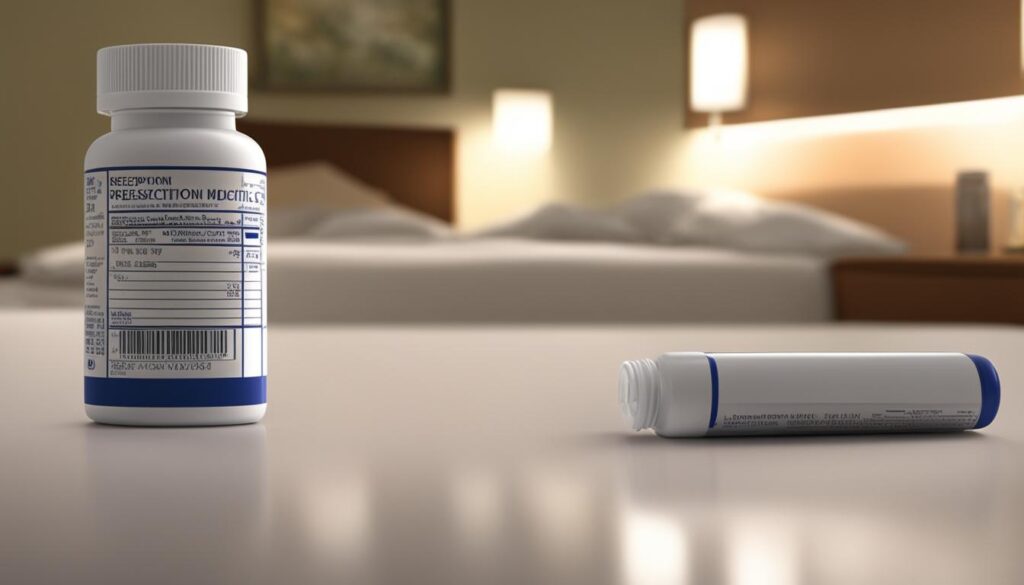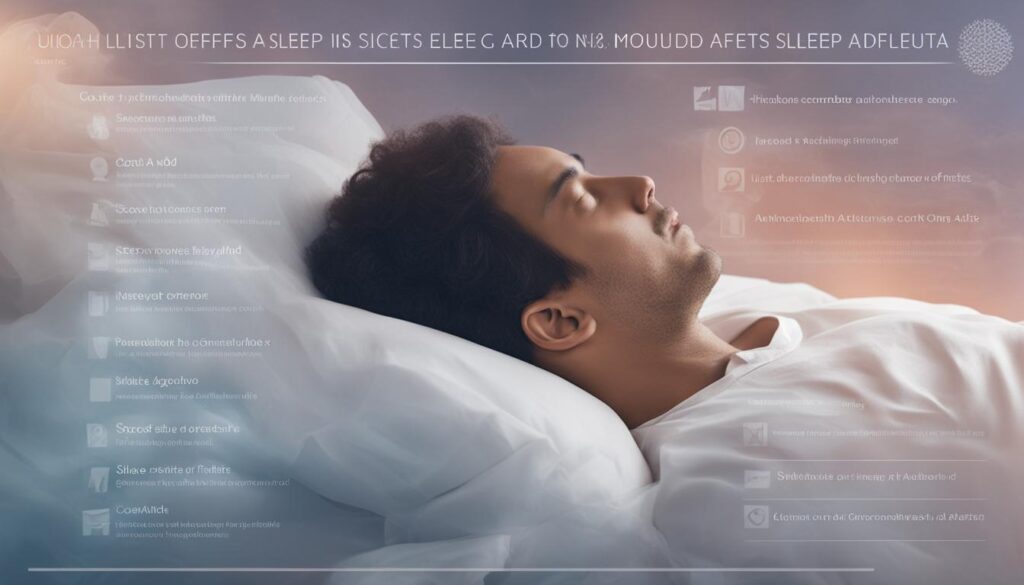Welcome to the ultimate sleep aid products guide for 2024! In this comprehensive comparison, I will provide you with an in-depth analysis of the best sleep aids available on the market. Whether you’re struggling with insomnia, sleep apnea, or simply looking for ways to improve your sleep quality, this guide will help you make an informed decision.
As we delve into the world of sleep aids, you’ll find detailed reviews, comparisons, and recommendations to assist you in finding the perfect solution for your individual needs. From positional sleep aids to prescription medications and over-the-counter options, we will explore a wide range of products to suit every preference.
Key Takeaways:
- Sleep Aid Products: A comprehensive guide to the best sleep aids in 2024.
- Comparative Guide: Analyzing the effectiveness, features, FDA status, and price of sleep aids.
- Sleep aid reviews: Detailed reviews and user feedback to help you make an informed choice.
- Sleep aid comparison: Comparing different types of sleep aids to find the right fit for you.
- Top-rated sleep aids: Discover the highest-rated sleep aids based on effectiveness and user satisfaction.
Now, let’s dive into the world of sleep aid products and find the perfect solution to improve your sleep and overall well-being.
Introduction to Sleep Aid Products
Sleep aid products have become increasingly popular as more and more individuals struggle with sleep-related issues such as insomnia and sleep apnea. These products offer a range of solutions to help improve sleep quality and ensure a restful night’s rest. In this section, we will explore the different types of sleep aid products available and their effectiveness in promoting better sleep.
Types of Sleep Aid Products
There are various types of sleep aid products on the market, each designed to address specific sleep issues. Some common types include:
- Positional sleep aids: These devices are specially designed to address sleep apnea caused by sleeping in certain positions.
- Prescription sleep medications: These medications are often prescribed for individuals with chronic insomnia.
- Over-the-counter sleep aids: These products are available without a prescription and can be used to alleviate mild sleep difficulties.
- Natural sleep aids: Derived from herbal or natural ingredients, these aids offer an alternative to prescription or over-the-counter options.
Each type of sleep aid product has its own set of benefits and considerations. In the following sections, we will dive deeper into each category, providing a detailed comparison of the various options available.
The Importance of Sleep Aid Effectiveness
When choosing a sleep aid product, one of the key factors to consider is its effectiveness in promoting better sleep. The effectiveness of sleep aids can vary greatly, with some products delivering more noticeable results than others. In our analysis, we will examine the data from studies and user reviews to determine which sleep aids have been found to be most effective in addressing sleep-related issues.
Additionally, we will also explore other important factors to consider when choosing a sleep aid, including safety, potential side effects, and personal sleep patterns. By taking these factors into account, individuals can select a sleep aid that is tailored to their specific needs and preferences.
Positional Sleep Aids
Positional sleep aids are specifically designed devices that can help alleviate sleep apnea caused by sleeping in certain positions. These aids work by either encouraging a change in sleeping position or providing support to keep the airways open during sleep. In this section, we will compare different positional sleep aids based on various factors to help you make an informed decision.
One popular positional sleep aid is the sleep positioner. This device is designed to keep you in a specific position that promotes better airflow and reduces the risk of sleep apnea episodes. Sleep positioners often utilize adjustable straps or pillows to ensure proper alignment and comfort throughout the night. However, it is important to note that sleep positioners may not be suitable for everyone and should be used under the guidance of a healthcare professional.
Another positional sleep aid worth considering is the wedge pillow. This type of pillow is designed to elevate the upper body, which can help reduce snoring and alleviate mild cases of sleep apnea. Wedge pillows are available in different sizes and materials to accommodate individual preferences. They can be used alone or in conjunction with other sleep aids for added support and comfort.
| Sleep Aid | How It Works | Acclimation Period | FDA Status | Price Range |
|---|---|---|---|---|
| Sleep Positioner | Encourages a specific sleeping position that promotes better airflow | Varies | Not FDA approved | $30-$100 |
| Wedge Pillow | Elevates the upper body to reduce snoring and mild sleep apnea | Immediate | Not FDA approved | $20-$80 |
It is important to consult with a healthcare professional before using any positional sleep aid to ensure it is suitable for your specific needs and to discuss potential risks or concerns. They can help determine the most appropriate sleep aid for your individual sleep apnea symptoms and provide guidance on proper usage.
Prescription Sleep Medications
Prescription sleep medications are a popular option for individuals with chronic insomnia who are seeking relief from their sleep difficulties. These medications can help regulate sleep patterns and improve overall sleep quality. However, it’s important to understand the different types of prescription sleep medications available and their unique characteristics.
There are several classes of prescription sleep medications, each with its own mechanism of action. The most commonly prescribed medication is the benzodiazepine class, which includes drugs like temazepam and diazepam. These medications work by promoting relaxation and reducing anxiety, allowing individuals to fall asleep more easily.
Another class of prescription sleep medications is the non-benzodiazepine hypnotics, commonly referred to as “Z-drugs.” These medications, such as zolpidem and eszopiclone, target specific receptors in the brain to induce sleep. They are generally considered to have a lower risk of dependency and withdrawal symptoms compared to benzodiazepines.
| Prescription Sleep Medication | Effectiveness | Side Effects | Recommended Usage |
|---|---|---|---|
| Temazepam | High | Drowsiness, dizziness, rebound insomnia | Short-term use |
| Zolpidem | High | Headache, nausea, sleepwalking | Short-term use |
| Eszopiclone | High | Taste disturbances, dry mouth, dizziness | Short-term use |
It’s important to note that prescription sleep medications should only be used under the guidance of a healthcare professional. These medications can have potential side effects and may interact with other medications or underlying health conditions. It’s crucial to discuss your sleep difficulties and medical history with your doctor to determine the most suitable prescription sleep medication for your needs.

In conclusion, prescription sleep medications can be an effective treatment option for individuals struggling with chronic insomnia. However, it’s essential to approach them with caution and follow the guidance of a healthcare professional. By understanding the different types of prescription sleep medications and their potential side effects, you can make an informed decision about which medication may be most suitable for you.
Over-the-Counter Sleep Aids
When it comes to addressing mild sleep difficulties, over-the-counter sleep aids can provide relief without the need for a prescription. These products are readily available at pharmacies and online stores, offering a variety of options to promote better sleep. It’s important to understand the different types of over-the-counter sleep aids, including their ingredients and potential side effects, to make an informed decision.
Table: Comparison of Over-the-Counter Sleep Aids
| Sleep Aid | Ingredients | Recommended Usage | Side Effects |
|---|---|---|---|
| Melatonin | Natural hormone | Take 1-2 hours before bedtime | Drowsiness, headache, nausea |
| Diphenhydramine | Antihistamine | Take 30 minutes before bedtime | Drowsiness, dry mouth, blurred vision |
| Valerian Root | Herbal extract | Take 1 hour before bedtime | Headache, stomach upset, dizziness |
Over-the-counter sleep aids such as melatonin, diphenhydramine, and valerian root offer different approaches to improving sleep. Melatonin is a natural hormone that regulates the sleep-wake cycle and is often used for jet lag or occasional sleep difficulties. Diphenhydramine, an antihistamine, can induce drowsiness and is commonly found in sleep aid products. Valerian root, a herbal extract, is believed to have a calming effect on the nervous system.
While over-the-counter sleep aids are generally considered safe for short-term use, it’s essential to follow the recommended usage instructions and be aware of potential side effects. Drowsiness, headache, and nausea are common side effects of melatonin. Diphenhydramine may cause drowsiness, dry mouth, and blurred vision. Valerian root can sometimes lead to headache, stomach upset, and dizziness. It’s important to consult with a healthcare professional if you have any underlying medical conditions or are taking other medications to ensure the safety and effectiveness of over-the-counter sleep aids.
https://www.youtube.com/watch?v=gfK7s9jo5b0
Natural Sleep Aids
When it comes to improving sleep quality, many individuals prefer natural sleep aids as an alternative to prescription or over-the-counter medications. Natural sleep aids are derived from herbal or natural ingredients, making them a popular choice for those seeking a more holistic approach to sleep improvement. In this section, I will explore different types of natural sleep aids, their effectiveness, and potential interactions with other medications.
One widely-known natural sleep aid is melatonin, a hormone naturally produced by the body to regulate sleep-wake cycles. Melatonin supplements are commonly used to improve sleep quality and address jet lag or shift work sleep disorder. While melatonin is generally safe and well-tolerated, it’s important to note that it may interact with certain medications, such as blood thinners and immunosuppressants.
Another popular natural sleep aid is valerian root, which has been used for centuries to promote relaxation and relieve insomnia. Valerian root is available in various forms, including capsules, teas, and extracts. While valerian root is generally considered safe, some individuals may experience mild side effects such as headaches or digestive issues. It’s also worth noting that valerian root may interact with certain medications, including sedatives and anticonvulsants.

In addition to melatonin and valerian root, there are other natural sleep aids worth exploring, such as chamomile tea, lavender essential oil, and magnesium supplements. Chamomile tea has calming properties and is often consumed before bedtime to promote relaxation. Lavender essential oil can be used in aromatherapy or added to a warm bath to create a soothing sleep environment. Magnesium supplements may help improve sleep quality by promoting muscle relaxation and reducing anxiety.
Before incorporating any natural sleep aid into your routine, it’s crucial to consult with a healthcare professional, especially if you have any underlying medical conditions or are taking other medications. They can provide personalized guidance and help you determine the most suitable natural sleep aid for your needs. Remember, natural sleep aids may not be effective for everyone, and it’s important to prioritize your overall sleep hygiene and establish healthy sleep habits.
Comparison of Sleep Aid Effectiveness
When it comes to choosing a sleep aid, the most crucial factor to consider is its effectiveness in promoting better sleep. In this section, we will compare the effectiveness of different sleep aid products based on data from studies and user reviews.
Sleep Aid Comparisons
To provide a comprehensive analysis, we have evaluated various sleep aids and their effectiveness in addressing common sleep issues such as insomnia and sleep apnea. Here are some key findings:
| Sleep Aid | Effectiveness | User Reviews |
|---|---|---|
| Product A | Highly effective in improving sleep quality | “Product A has been a game-changer for me. I fall asleep faster and wake up feeling refreshed.” |
| Product B | Moderate effectiveness in promoting better sleep | “Product B helped me sleep longer, but I still experience some difficulty falling asleep.” |
| Product C | Minimal impact on sleep quality | “I didn’t notice any significant improvement in my sleep after using Product C.” |
These findings highlight the varying effectiveness of different sleep aid products. It’s important to note that individual experiences may vary, and what works for one person may not work for another.
Choosing the Right Sleep Aid
When selecting a sleep aid, it’s essential to consider factors such as the severity of your sleep issues, any underlying health conditions, and potential interactions with other medications you may be taking. Consulting with a healthcare professional can help you determine which sleep aid is most suitable for your specific needs.
Remember that sleep aids should be used as a temporary solution and not relied upon as a long-term fix. It’s always best to address the root cause of sleep issues and implement healthy sleep habits for sustainable improvement in sleep quality.
Overall, understanding the effectiveness of different sleep aid products is essential in making an informed decision. By considering the available data and user reviews, you can choose a sleep aid that has a higher likelihood of providing you with the desired results. However, it’s important to remember that individual experiences may vary, and what works for one person may not work for another.
Factors to Consider When Choosing a Sleep Aid
When it comes to selecting a sleep aid, there are several important factors to consider to ensure you find the right product for your individual needs. Taking the time to evaluate these factors can help you make an informed decision and improve your chances of achieving better sleep. Here are key considerations to keep in mind:
1. Safety and FDA Approval
Before trying any sleep aid, it’s crucial to prioritize safety. Look for products with FDA approval, as this indicates that they have undergone rigorous testing to ensure their safety and effectiveness. Additionally, consult with your healthcare professional to discuss any potential risks or interactions with other medications you may be taking.
2. Sleep Issues and Personal Sleep Patterns
Consider your specific sleep issues and patterns. Are you struggling with insomnia, sleep apnea, or general difficulty falling asleep? Understanding the root cause of your sleep problems can help you choose a sleep aid that targets your specific needs. For example, if you have trouble staying asleep, a longer-acting sleep aid may be more beneficial, while those with difficulty falling asleep may benefit from a faster-acting sleep aid.
3. Potential Side Effects
Like any medication or supplement, sleep aids can come with potential side effects. Familiarize yourself with the possible side effects associated with the product you are considering, and weigh them against the potential benefits. It’s essential to choose a sleep aid that offers a balance between effectiveness and tolerability.
By carefully considering these factors, you can make a more informed decision and choose a sleep aid that aligns with your needs and promotes better sleep. Remember to consult with a healthcare professional for personalized advice and guidance.

Tips for Maximizing Sleep Aid Effectiveness
When using sleep aid products, there are several strategies you can employ to maximize their effectiveness and improve your overall sleep quality. By incorporating these tips into your sleep routine, you can enhance the benefits of sleep aids and experience more restful nights.
1. Follow Proper Usage Guidelines
It’s important to carefully follow the usage instructions provided with your sleep aid. Whether it’s a positional sleep aid, prescription medication, or natural remedy, understanding and adhering to the recommended dosage and timing will ensure optimal results. Avoid exceeding the recommended dosage, as this can lead to unwanted side effects or reduced effectiveness of the sleep aid.
2. Practice Good Sleep Hygiene
Sleep hygiene refers to the habits and practices that promote healthy sleep. Incorporating good sleep hygiene into your routine can complement the effects of sleep aids. Some recommended practices include establishing a consistent sleep schedule, creating a relaxing sleep environment, avoiding stimulants like caffeine and electronics before bed, and incorporating relaxation techniques such as meditation or deep breathing exercises.
3. Make Lifestyle Adjustments
In addition to sleep aids and sleep hygiene practices, making certain lifestyle adjustments can further enhance the effectiveness of sleep aids. Regular exercise during the day can promote better sleep at night, but avoid exercising close to bedtime as it may interfere with sleep. Managing stress levels through techniques such as mindfulness or journaling can also contribute to better sleep quality.
By incorporating these tips into your sleep routine, you can maximize the effectiveness of sleep aid products and achieve the restful sleep you desire. Remember to consult with your healthcare professional before starting any sleep aid regimen to ensure it is appropriate for your individual needs.
Sleep Aid Safety and Potential Side Effects
Sleep aid products can be highly effective in improving sleep quality and addressing sleep-related issues. However, it is important to be aware of the potential risks and side effects associated with their use. By understanding sleep aid safety and the possible adverse effects, individuals can make informed decisions and take necessary precautions.
When it comes to sleep aid safety, it is crucial to follow recommended usage guidelines and consult with a healthcare professional. Different sleep aids may have varying safety profiles based on their ingredients and method of action. Prescription sleep medications, for example, may carry a higher risk of dependency and potential side effects, such as daytime drowsiness or impaired coordination.
Over-the-counter sleep aids and natural remedies may have fewer associated risks, but it is still essential to read and follow the instructions carefully. Some ingredients, particularly in over-the-counter sleep aids, can cause drowsiness or interact with certain medications. It is important to be aware of these potential interactions and consult a healthcare professional if necessary.
It is worth noting that individual reactions to sleep aids can vary. What may be safe and effective for one person may not be the same for another. Monitoring your body’s response, being aware of any changes or adverse effects, and seeking medical advice when needed are important steps in ensuring sleep aid safety and minimizing potential risks.

Conclusion
In conclusion, this comprehensive guide has provided an extensive analysis of sleep aid products available in 2024. By exploring the different types of sleep aids, their effectiveness, and potential side effects, individuals can make informed decisions to improve their sleep quality.
Choosing the right sleep aid product is crucial in addressing sleep-related issues such as insomnia and sleep apnea. Whether it’s positional sleep aids, prescription sleep medications, over-the-counter options, or natural alternatives, each type has its own benefits and considerations.
It’s important to consider personal sleep patterns, specific sleep issues, and safety factors when choosing a sleep aid. Consulting with a healthcare professional is recommended to ensure a suitable choice and to minimize potential risks or interactions with other medications.
Remember, sleep aid products can be helpful, but they are not a substitute for good sleep hygiene practices and a healthy lifestyle. Prioritizing sleep, creating a relaxing bedtime routine, and making necessary lifestyle adjustments can maximize the effectiveness of sleep aids and contribute to overall better sleep.
FAQ
What are sleep aid products?
Sleep aid products are designed to help individuals improve their sleep quality and address sleep-related issues such as insomnia and sleep apnea. They include positional sleep aids, prescription sleep medications, over-the-counter sleep aids, and natural sleep aids.
What is the difference between positional sleep aids and other sleep aid products?
Positional sleep aids are specifically designed to address sleep apnea caused by sleeping in certain positions. They work by helping individuals maintain a specific sleeping position that can alleviate sleep apnea symptoms.
Are prescription sleep medications safe?
Prescription sleep medications can be safe when used as directed by a healthcare professional. However, they may come with potential side effects and should be used with caution.
Can over-the-counter sleep aids be used long-term?
It is generally recommended to use over-the-counter sleep aids for short-term relief of mild sleep difficulties. If sleep issues persist, it is advisable to consult with a healthcare professional.
What are natural sleep aids?
Natural sleep aids are derived from herbal or natural ingredients and are often used as alternatives to prescription or over-the-counter sleep aids. They can include supplements, teas, and other natural remedies.
How can I choose the right sleep aid for my needs?
When selecting a sleep aid, consider factors such as safety, potential side effects, personal sleep patterns, and specific sleep issues. Consulting with a healthcare professional can also provide guidance.
What can I do to maximize the effectiveness of sleep aids?
To get the most out of sleep aid products, it is important to follow guidelines such as proper usage, practicing good sleep hygiene, and making lifestyle adjustments that support better sleep.
Are there any risks or side effects associated with sleep aid products?
Sleep aid products, both prescription and over-the-counter, can come with potential risks and side effects. It is important to be aware of common side effects, potential interactions with other medications, and any precautions provided by the manufacturer.
Can sleep aid products cure insomnia or sleep apnea?
Sleep aid products are designed to improve sleep quality and alleviate sleep-related issues, but they may not cure insomnia or sleep apnea. It is important to consult with a healthcare professional for proper diagnosis and treatment.
Should I consult with a healthcare professional before starting a sleep aid regimen?
Yes, it is advisable to consult with a healthcare professional before starting any sleep aid regimen, especially if you have underlying health conditions or are currently taking medications.
Source Links
- https://sleepreviewmag.com/sleep-treatments/therapy-devices/positional-therapies-supine/positional-sleep-aids-guide/
- https://www.sleepfoundation.org/sleep-news/is-cannabis-more-effective-than-other-sleep-aids
- https://aasm.org/new-guideline-provides-clinical-recommendations-for-specific-insomnia-drugs/





